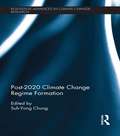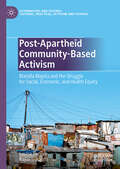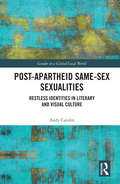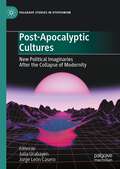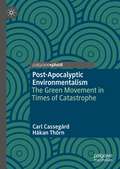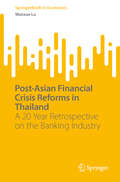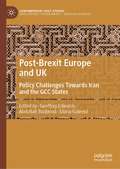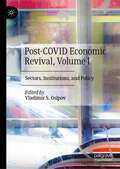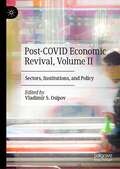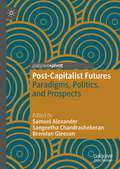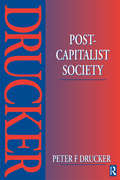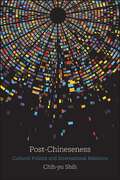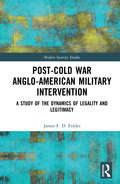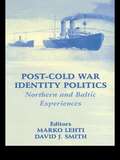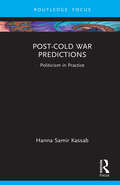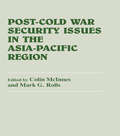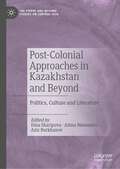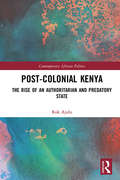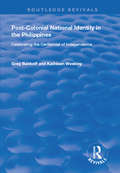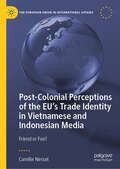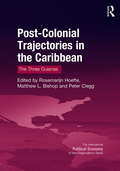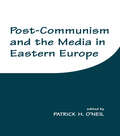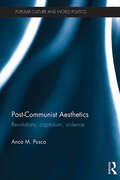- Table View
- List View
Post-2020 Climate Change Regime Formation (Routledge Advances in Climate Change Research)
by Suh-Yong ChungThe fate of the climate change regime hangs in the balance as the UN-led negotiations try to forge a new international strategy for the post-2020 period. Since 1992, the UNFCCC and its Kyoto Protocol has been the primary legal instrument to respond to the climate challenge. However, the intergovernmental process has been riddled with problems that have rendered it ineffective. The changing economic landscape has further made this country grouping problematic as some developing countries now emit more than some of their advanced counterparts. Such problems have crippled the existing regime in adequately addressing climate change. Building upon the expertise of the contributors of this volume, this ground-breaking collection aims to show the way forward for the intergovernmental process. It is the first of its kind to explore the key features of the regime, featuring meticulously researched pieces from leading experts in the field. Each chapter responds to the questions surrounding the political and structural limitations of the current top-down approach taken in climate negotiations and proposes various alternatives countries can take to overcome such limitations in the process of building the post-2020 climate change regime. In particular, this collection underscores the concept of low-carbon development and green growth to make the climate change regime more effective.
Post-Apartheid Community-Based Activism: Mandla Majola and the Struggle for Social, Economic, and Health Equity (Alternatives and Futures: Cultures, Practices, Activism and Utopias)
by Rajini Srikanth Louise PennerThis book provides a timely study of community-based activism in contemporary South Africa. Grounded in oral history, the book examines the acquired expertise and life experiences of an impactful South African activist, Mandla Majola, within the context of the people, circumstances, and affiliations that have shaped his strategic thinking and practice. The authors situate Mandla Majola’s activist and everyday experiences within histories of the complex connections between post-apartheid political and social movements and human rights discourse as they emerged after 1994. The book illuminates the relationship of state power to public health activism for HIV, tuberculosis and COVID-19 and for a life of basic human dignity, including access to sanitation and housing. Mandla Majola’s life spotlights the inspiring, sometimes grueling, and tireless quotidian work of thousands of “invisible” community-based activists whose collective actions have impacted the entire spectrum of social and economic rights of untold numbers of people in South Africa and beyond.
Post-Apartheid Same-Sex Sexualities: Restless Identities in Literary and Visual Culture (Gender in a Global/Local World)
by Andy CarolinThis book examines how same-sex sexualities are represented in several post-apartheid South African cultural texts, drawing on a rich local archive of same-sex sexualities that includes recent fiction, drama, film, photography, and popular print culture. While the book situates these texts within the specific context of post-apartheid South Africa, it also looks outwards towards transnational connectivity and cultural flows. The author uses the idea of restlessness to refer to the uneven flow of cultural tropes, political sentiment, ideas, ideologies, and representational modes across geographical boundaries, across time and space, and between genres, presenting sexual cultures as simultaneously rooted and transnational. He focuses on how notions of race and gender, in the shadow of colonialism and apartheid, play out in the present and shape how sexualities are represented. This interdisciplinary book offers a conceptual entry point to several areas of study, including transnationalism, literary and cultural studies, critical race theory, gender and sexuality studies, and African studies, and will be of interest to students and researchers across these fields. Its inclusion of a range of textual genres extends its reach into visual culture, film and media studies, history, and politics.
Post-Apocalyptic Cultures: New Political Imaginaries After the Collapse of Modernity (Palgrave Studies in Utopianism)
by Julia Urabayen Jorge León CaseroThis book advocates for the necessity of recovering the value of utopias as political projects that open new channels of action. The criticism of modern political utopias is based on the supposed impossibility of creating for the future because there is no longer a future (apocalyptic ideology). However, this edited collection seeks to show that the post-apocalyptic world in which we live entails a renewed freedom of design for the radical reorganization of institutions. Post-apocalyptic cultures are not obligated to follow the capitalist, anthropocentric, correlationist and sovereign modes of the old political project of emancipation—the Western enlightenment—that has started to collapse. With this in mind, this book is divided into four sections dedicated to the main themes from which to rethink the projects of political emancipation that are possible nowadays: technopolitics; posthumanist biopolitics; non-western politicsl and the crossover between arts and politics.
Post-Apocalyptic Environmentalism: The Green Movement in Times of Catastrophe
by Håkan Thörn Carl CassegårdThis book analyses how the environmental movement has developed three overarching narratives that co-exist and compete within it. The first is the narrative of green progress, which has been prominent from the start in environmentalist thought and which is today expressed in the idea of sustainable development and in eco-modernism. The second is the apocalyptic narrative, which urges us to act in order to avert a future catastrophe and which rose to prominence with Rachel Carson and other classics of post-war environmentalism and experienced a renaissance with the climate activism of the 2000s. The third is the postapocalyptic narrative according to which catastrophe is already an unavoidable fact. The centrepiece of the book is its discussion of the postapocalyptic narrative, which has become influential in the recent decade, especially in the wake of the disillusionment following the failed climate summit in Copenhagen 2009. Climate change, resource exhaustion, pollution and species extinction signal that catastrophes have already become realities here and now for an enormous number of people and other lifeforms. The book probes the possibilities and limitations of the environmental movement in grappling with these issues and turning them into relevant action.
Post-Asian Financial Crisis Reforms in Thailand: A 20 Year Retrospective on the Banking Industry (SpringerBriefs in Economics)
by Wanxue LuThis book is distinguished for its longitudinal, evidence-based policy analysis concerning the impacts of financial regulatory reforms post-crisis, thereby enriching the comprehension of policy impact mechanisms at a micro-level. Distinguished from collections of past events; this monograph is a lens through which the intricate relationships between regulatory changes, market dynamics, and organizational behavior are explored and understood. The study is devoted to a thorough 20-year retrospective analysis of Thailand's financial regulatory reforms and their complex effects on the commercial banking sector. It uncovers how these reforms, particularly the increase in foreign participation, have paradoxically degraded market competition while also not fully achieving their intended goals in financial technology advancement. This nuanced understanding underscores the book's impact in rethinking policy effectiveness and market dynamics in a global context. Moreover, by offering a unique blend of macro- and micro-perspectives, the book delves into how these regulatory impacts materialize at the organizational level. Through an in-depth examination of business practices and governance in banking, it provides vital insights into how family-owned banks in Thailand have navigated economic crises, transitioning from ownership control to management control models.
Post-Brexit Europe and UK: Policy Challenges Towards Iran and the GCC States (Contemporary Gulf Studies)
by Geoffrey Edwards Abdullah Baabood Diana GaleevaThis book discusses how tensions and unknowns may impact future relations between a post-Brexit UK, the EU and the countries of the Gulf, including Iran. The authors of this book consider, in different ways, whether British and EU27 relations with the Gulf States may change or whether the traditions and the weight of their history reinforce the pre-existing patterns of these relationships. Ongoing changes in the Gulf, the present disputes and the trajectories economic reform also influence these discussions. The book analyses the changing positions of the US, China and Russia that are likely to impact Europe’s interests. It explores outcomes of ongoing world challenges, such as the COVID-19 pandemic and the crash of oil prices, to further examine Post-Brexit Europe and UK policy challenges towards Iran and the GCC States.
Post-COVID Economic Revival, Volume I: Sectors, Institutions, and Policy
by Vladimir S. OsipovThis two-volume book examines the most important global problem—the recovery of the social-economic crises due to the COVID-19 pandemic. This economic crisis has its own basis and differs from others by the lockdown of most businesses on the decision of authorities. The uncertainty of the future economic revival obliges scientists around the world to unite in search of effective solutions that will become the basis for prosperity and human wellbeing.The death of millions of people around the world, several waves of coronavirus, and a global pandemic have forced most states to seek extraordinary measures to save people and revive economic activity. The world economy experienced a global shock, probably never experienced before due to lockdowns. The disruptions and gaps in the value chains were primarily caused by the lockdowns of enterprises. The change in the essence of the economic crisis has raised the question of how to overcome it and revive economic activity. The crisis caused a sharp decline in incomes of the population around the world, which led to social upheavals. Post-COVID economic revival in a globalized world has become the most important problem of our time. This book offers contributions of authors from different countries and explores problem solving in the fields of public administration (Volume I, Part I), financial services (Volume I, Part II), different branches (Volume II, Part III) and the social sector (Volume II, Part IV).The first volume discusses governmentality, public, and corporate management. The second part of the volume reveals the trends in the development of the financial sector in the post-COVID period. Despite the fact that the book is divided into two volumes and four parts, a holistic and systematic perception of the new reality of the post-COVID age can be obtained by reading the entire book. This book will be of interest to academics and practitioners in public administration and economics, particularly those who are interested in Post-COVID economic revival.
Post-COVID Economic Revival, Volume II: Sectors, Institutions, and Policy
by Vladimir S. OsipovThis two-volume book examines the most important global problem—the recovery of the social-economic crises due to the COVID-19 pandemic. This economic crisis has its own basis and differs from others by the lockdown of most businesses on the decision of authorities. The uncertainty of the future economic revival obliges scientists around the world to unite in search of effective solutions that will become the basis for prosperity and human wellbeing. The death of millions of people around the world, several waves of coronavirus, and a global pandemic have forced most states to seek extraordinary measures to save people and revive economic activity. The world economy experienced a global shock, probably never experienced before due to lockdowns. The disruptions and gaps in the value chains were primarily caused by the lockdowns of enterprises. The change in the essence of the economic crisis has raised the question of how to overcome it and revive economic activity. The crisis caused a sharp decline in incomes of the population around the world, which led to social upheavals. Post-COVID economic revival in a globalized world has become the most important problem of our time. This book offers contributions of authors from different countries and explores problem solving in the fields of public administration (Volume I, Part I), financial services (Volume I, Part II), different branches (Volume II, Part III) and the social sector (Volume II, Part IV). The second volume of the book is devoted problems in sectors of the economy, such as agriculture, tourism, aircraft, the automotive industry, electricity, culture, etc. The second part of the second volume examines trends in the revival in the social sector—medicine, pharmaceuticals, the labor market and social insurance. Despite the fact that the book is divided into two volumes and four parts, a holistic and systematic perception of the new reality of the post-COVID age can be obtained by reading the entire book. This book will be of interest to academics and practitioners in public administration and economics, particularly those who are interested in Post-COVID economic revival.
Post-Capitalist Futures: Paradigms, Politics, and Prospects (Alternatives and Futures: Cultures, Practices, Activism and Utopias)
by Samuel Alexander Brendan Gleeson Sangeetha ChandrashekeranAs the crises of capitalism continue to intensify, radical thinkers must conjure realistic and inspirational alternative futures beyond this failing social order. This book presents a stimulating array of essays exploring such post-capitalist futures. With contributions and perspectives from the Global North and Global South, central topics include ecosocialism, ecofeminism, degrowth, community economies, and the Green New Deal. There are also chapters offering analyses of land, energy, technology, universal basic services, and (re)localisation of economies. The book is in three parts. The first presents various alternative paradigms for thinking about – and working toward – post-capitalist futures. The second section offers perspectives on alternative governance strategies and approaches for post-capitalist futures. The closing section gathers various analyses of post-capitalist geographies and resistance. Going beyond critique and instead envisioning alternative imaginaries, this collection should challenge and inspire readers to think and act upon the range of possibilities immanent in our crisis-ridden present.
Post-Capitalist Society
by Peter DruckerWe are in the middle of another time of radical economic change, from the Age of Capitalism and the Nation-State, to a Knowledge Society.
Post-Capitalist Society
by Peter Drucker"The basic economic resource - 'the means of production', to use the economist's term - is no longer capital, nor natural resources, nor 'labour'. it is an will be knowledge."With penetrating insight Peter Drucker describes the changes that are affecting politics, business and society itself. It is vital that we are aware of and understand these changes in order to benefit from the opportunities that the future has to offer.
Post-Chineseness: Cultural Politics and International Relations (SUNY series, James N. Rosenau series in Global Politics)
by Chih-yu ShihThere have been few efforts to overcome the binary of China versus the West. The recent global political environment, with a deepening confrontation between China and the West, strengthens this binary image. Post-Chineseness boldly challenges the essentialized notion of Chineseness in existing scholarship through the revelation of the multiplicity and complexity of the uses of Chineseness by strategically conceived insiders, outsiders, and those in-between. Combining the fields of international relations, cultural politics, and intellectual history, Chih-yu Shih investigates how the global audience perceives (and essentializes) Chineseness. Shih engages with major Chinese international relations theories, investigates the works of sinologists in Hong Kong, Singapore, Pakistan, Taiwan, Vietnam, and other academics in East Asia, and explores individual scholars' life stories and academic careers to delineate how Chineseness is constantly negotiated and reproduced. Shih's theory of the "balance of relationships" expands the concept of Chineseness and effectively challenges existing theories of realism, liberalism, and conventional constructivism in international relations. The highly original delineation of multiple layers and diverse dimensions of "Chineseness" opens an intellectual channel between the social sciences and humanities in China studies.
Post-Cold War Anglo-American Military Intervention: A Study of the Dynamics of Legality and Legitimacy (Modern Security Studies)
by James F. FiddesExploring case studies from the first Gulf War to the Syria crisis, this book discusses different approaches to the use of international law and the role it plays in international power politics. Analysis of the post-Cold War overseas military involvements of Western powers has focused on their legality and legitimacy, allowing for a conflation of the concepts and distracting from the true source of international legitimacy. Demonstrating compliance with international law can be helpful, but it plays a secondary role to other, more powerful considerations such as national interest and shared national security concerns. Exploring the key drivers for decision-makers, this book identifies the impact of previous experience on the use of international law in the quest for legitimacy ahead of launching military action. Patterns in approach and of relations between close Western allies (in particular the UK and US) are identified, offering valuable lessons for future strategic decision-making. This book will appeal to scholars and students of International Relations and International Law. Think Tanks focussing on International Relations and the use of force and practitioners working in the realm of foreign policy with a focus on the UN and international law will also be interested in the study and conclusions drawn.
Post-Cold War Identity Politics: Northern and Baltic Experiences (Routledge Studies in Nationalism and Ethnicity)
by David J. Smith Marko LehtiDuring the past decade northern Europe has started to assume an identity of its own. Categories of East and West have become blurred, challenging as well the idea of what it means to be Nordic. Post-Cold War Identity Politics maps this process in Scandinavia. Looking at projects designed to help regional development in the Nordic countires, it assesses whether a new way of defining 'Northern-ness' is emerging. The book highlights the existence of co-existing and - to some extent - competing region-building projects in northern Europe. It demonstrates how they are all efforts by existing nations to redefine their role in Europe at a time of change, and points to how they might develop in the future.
Post-Cold War Predictions: Politicism in Practice (ISSN)
by Hanna Samir KassabPost- Cold War Predictions examines how the international order evolved after the collapse of the Soviet Union (and before the attacks on 9/11) by focusing on the ways we study and understand major powers’ security behavior within the evolving multipolar order. Beginning with an overview of Post-Cold War literature, Kassab summarizes and evaluates influential Post-Cold War texts to better understand scholarship’s need to predict. First, he discusses the central importance of power in international relations and drives home the central focus of international structures, linking findings to the broader structure-agent problem. He then reinterprets the purpose of theory, preferring explanatory theories to those that aim to predict outcomes. To understand the context by which political ideas were developed and followed as if they were political ideologies, Hanna Samir Kassab makes explicit the links between historicism and historiography, forwarding a new methodology for studying political science: Politicist analysis. Using simple jargon and defining terms where necessary, this succinct and enlightening text is required reading for all those interested in international politics.
Post-Cold War Security Issues in the Asia-Pacific Region
by Colin McInnes Mark G. RollsThe Asia-Pacific region presents a challenge to international security in the post-Cold War era. Doubts as to the US' military commitment, concern with Japan's security aspirations, build-up of military capabilities and the nuclear ambitions of North Korea have further heightened tension.
Post-Colonial Approaches in Kazakhstan and Beyond: Politics, Culture and Literature (The Steppe and Beyond: Studies on Central Asia)
by Dina Sharipova Alima Bissenova Aziz BurkhanovThis book explores the postcolonial discourse and decolonization processes in modern Kazakhstan and beyond. It pays particular attention to such areas as national and religious identity, language, literature, and historical narratives. Despite the fact that the post-colonial theory initially emerged in other regions of the world, it has increasingly been applied in the scholarship on Central Asia. Exploring recent debates on post-coloniality in Kazakhstan, this book is an attempt to bring together two bodies of scholarly literature: scholarship on culture and society in post-Soviet Central Asia and research on post-colonial theory. This volume will be of interest to scholars of Eurasian studies as well as researchers and students of post-colonialism in various contexts beyond Eurasia.
Post-Colonial Kenya: The Rise of an Authoritarian and Predatory State (Contemporary African Politics)
by Rok AjuluThis engaging reassessment of postcolonial Kenya argues that the country’s political turmoil over the last fifteen years is a continuation of repeating patterns of political contestation and conflict across Kenya’s history. When Kibaki stole the 2007 presidential election, leading to a spiral of violence that left over 1,000 people dead in the space of a month, many analysts wondered how this could happen in a country that had previously been considered an oasis of peace in an otherwise conflict prone region. Combining political economy with political sociology, in this book Rok Ajulu demonstrates that in fact authoritarianism and the predatory deployment of the state has been the predominant feature of Kenya’s post-colonial period. Focusing on how power has been mediated in the country politically and the characters of the elites in charge, the analysis shows the dominance of extra-economic political coercion in economic activity. In a context in which economic activity remains predominantly political, continued control of state-power is so crucial for the new ruling class that it must be retained at all costs. Rok Ajulu’s masterful final book is a powerful and wide-ranging contribution to studies on post-colonial Kenya and will be an important resource for researchers from across political science, economics, history, sociology and African Studies.
Post-Colonial National Identity in the Philippines: Celebrating the Centennial of Independence (Routledge Revivals)
by Greg Bankoff Kathleen WeekleyThis title was first published in 2002.Presenting a fresh understanding of the construction of Post-Colonial national identity in the new context of globalization, this text looks at the dilemmas of the requirement to compete in the global economy and the political demands of human rights and cultural differences. The authors are concerned with the ways in which a modern state attempts to mould the identities of its citizens and the ways in which the myriad of identities in a multiethnic, multicultural and multi-religious population give rise to intense contradictions. This important research will have implications beyond the Filipino case and will be of great interest to a wider audience as a reference for courses on Asian studies, political science and history.
Post-Colonial Perceptions of the EU’s Trade Identity in Vietnamese and Indonesian Media: Friend or Foe? (The European Union in International Affairs)
by Camille NesselThis book provides a comprehensive exploration of the European Union's trade policy and its external perception, incorporating a post-colonial perspective and utilizing a hermeneutic analysis of an extensive media dataset. It responds to the scholarly, educational, and practical demands for a deeper grasp of the intricate dynamics at the crossroads of trade, sustainable development, and identity development. The research delves into the EU's identity as a global normative trading entity, examining systemic, identity-related, and specific-issue dimensions. By focusing on bilateral trading connections with former European colonies, the study advances a fresh decentering agenda within the realm of EU foreign policy and international relations. This agenda incisively questions the EU's Eurocentric standpoint, communications, and behaviours in its external interactions, notably with past colonies of EU member states, particularly in the context of global trade. This is timely giventhe new geopolitical context, with increased ideological rivalries while urgently demanding international cooperation to channel the effects of climate change. Leveraging the concept of perceptions and framing, the research presents innovative insights substantiated by meticulous empirical observations. Consequently, this study enriches our comprehension of the EU's function and challenges as a trading entity and illuminates the intricacies of its interaction with Southeast Asian nations, contributing valuable wisdom to the domain of international relations.
Post-Colonial Realism: Cultural Conflicts, Cuisine, and the Changing International System
by Hanna Samir KassabIn Post-Colonial Realism, Hanna Samir Kassab develops a theoretical framework to explain, understand, and predict international conflict, placing culture at the center of international political analysis.Kassab contends that nationalism, a belief system, forms an intervening variable that shapes the foreign policy behavior of states. Studying food is central to understanding nationalist belief systems that shape international politics. By combining theories of nationalism with post-colonialist understandings of cultural revitalization, Kassab conceptualizes state motivation to understand how cultural symbols shape nationalist identities, to see the fault lines of civilization through food, and to appreciate the centrality of identity issues. Using ethnography to understand food ownership as part of nationalist conflict, Kassab examines neighboring states (Greece, North Macedonia, Turkey and Armenia) alongside India. In each country study chapter, he compares at least two nationalisms and views of cuisine ownership. He later maps out potential future flashpoints as the international system becomes increasingly competitive due to the changing structure of the international system: unipolarity to multipolarity.Post-Colonial Realism offers a more robust and flexible theory of international relations, concentrating not on abstractions but on individuals and their collective beliefs.
Post-Colonial Trajectories in the Caribbean: The Three Guianas (The International Political Economy of New Regionalisms Series)
by Rosemarijn Hoefte Peter Clegg Matthew L. BishopThis book compares and contrasts the contemporary development experience of neighbouring, geographically similar countries with an analogous history of exploitation but by three different European colonisers. Studying the so-called ‘Three Guianas’ (Guyana, Suriname and French Guiana) offers a unique opportunity to look for similarities and differences in their contemporary patterns of development, particularly as they grapple with new and complex shifts in the regional, hemispheric and global context. Shaped decisively by their respective historical experiences, Guyana, in tandem with the laissez-faire approach of Britain toward its Caribbean colonies, was decolonised relatively early, in 1966, and has maintained a significant degree of distance from London. The hold of The Hague over Suriname, however, endured well after independence in 1975. French Guiana, by contrast, was decolonised much sooner than both of its neighbours, in 1946, but this was through full integration, thus cementing its place within the political economy and administrative structures of France itself. Traditionally isolated from the Caribbean, the wider Latin American continent and from each other, today, a range of similar issues – such as migration, resource extraction, infrastructure development and energy security – are coming to bear on their societies and provoking deep and complex changes.
Post-Communism and the Media in Eastern Europe
by Patrick H. O’neilThis investigation of the media in Poland, the Czech Republic, Slovakia, Hungary, Romania and Bulgaria, seeks to outline the legacies of communism confronting media reform, and how interaction between the media, state, society and market has led to the particular and unique dynamics in each case.
Post-Communist Aesthetics: Revolutions, capitalism, violence (Popular Culture and World Politics)
by Anca M. PuscaIn this book, Anca Pusca seeks to extend the aesthetic and cultural turn in international relations to an analysis of post-communist transitions in Central and Eastern Europe. Building on the philosophy of Walter Benjamin and Jacques Ranciere, the work investigates how post-communist film, photography, theatre, art, museumization and architecture have creatively re-engaged with ideas of revolution, communism, capitalism and ethnic violence, and how this in turn has helped people survive and reinvent themselves amongst the material and ideological ruins of communism. The work illustrates how popular culture has effectively targeted and re-interpreted the classical representations of the transition in order to question: • The origin – focusing on practices of re-staging, memorializing and questioning the 1989 revolutions. • The unfolding – focusing on the human and material consequences of significant changes in processes of production and consumption. • The potential end – focusing on the illusions and disillusions surrounding the 'transition' process. A unique take on the influence that popular culture has had and continues to have on how we understand the post-communist transitions, this work will be of great interest to students and scholars of cultural and visual studies, eastern European politics and international relations.
